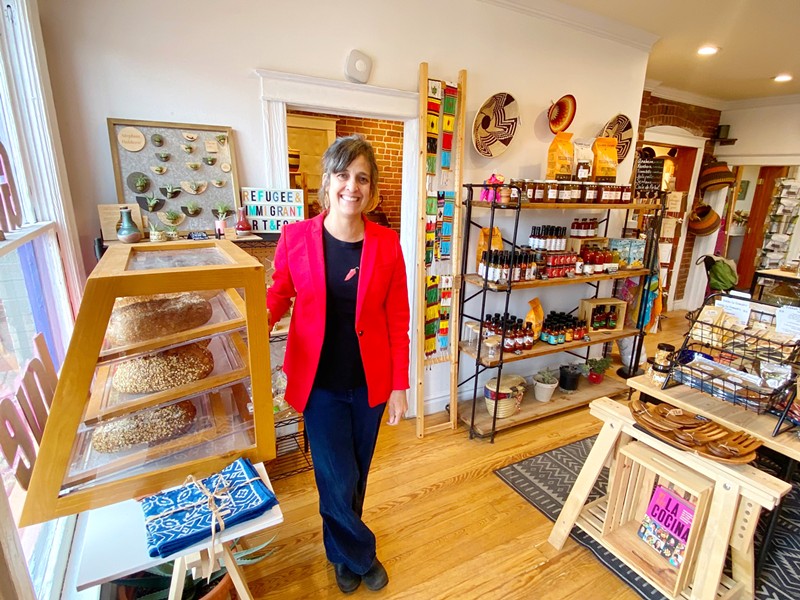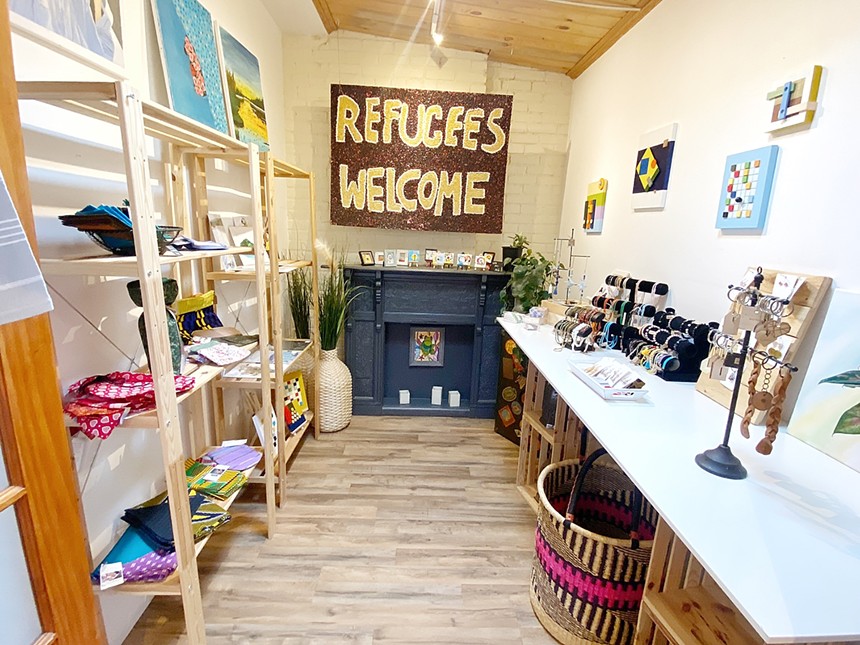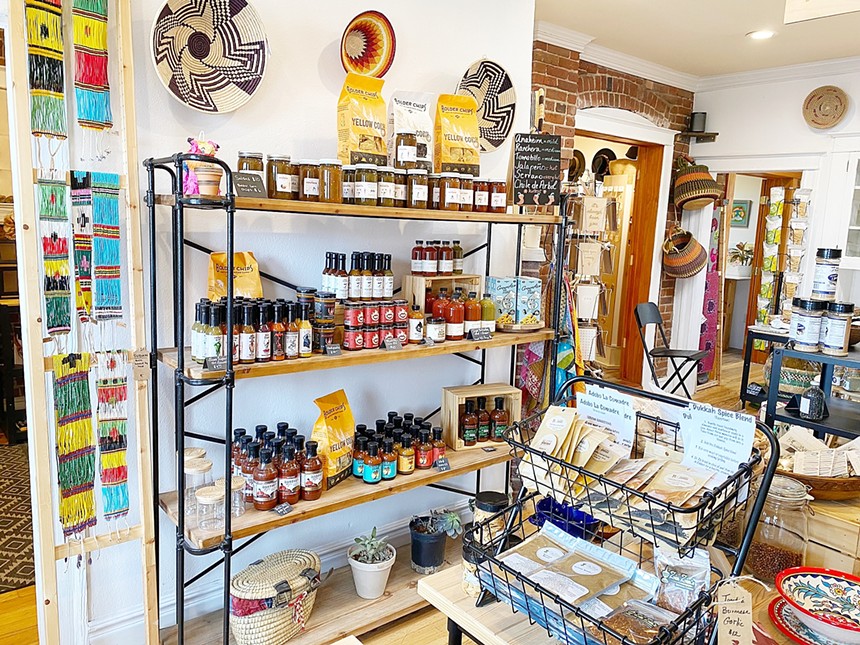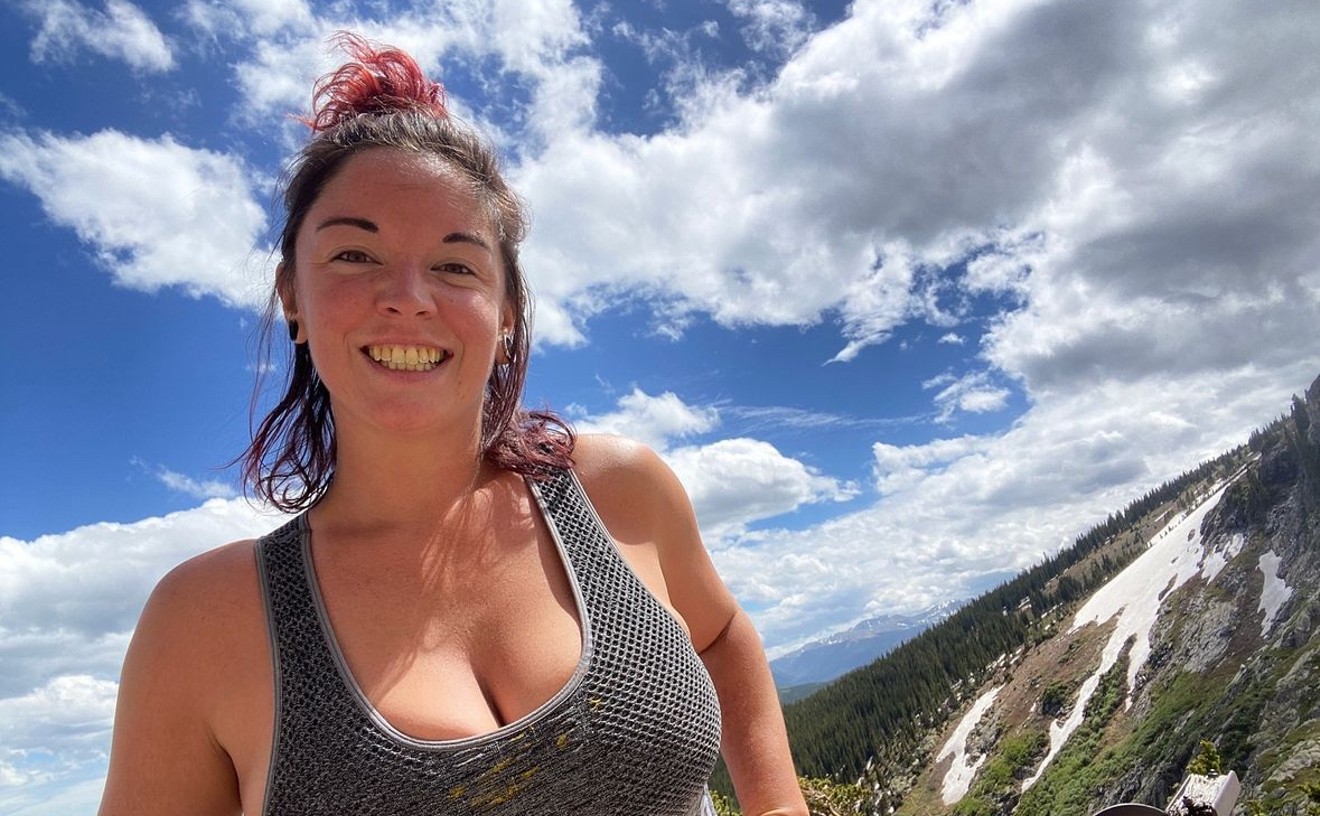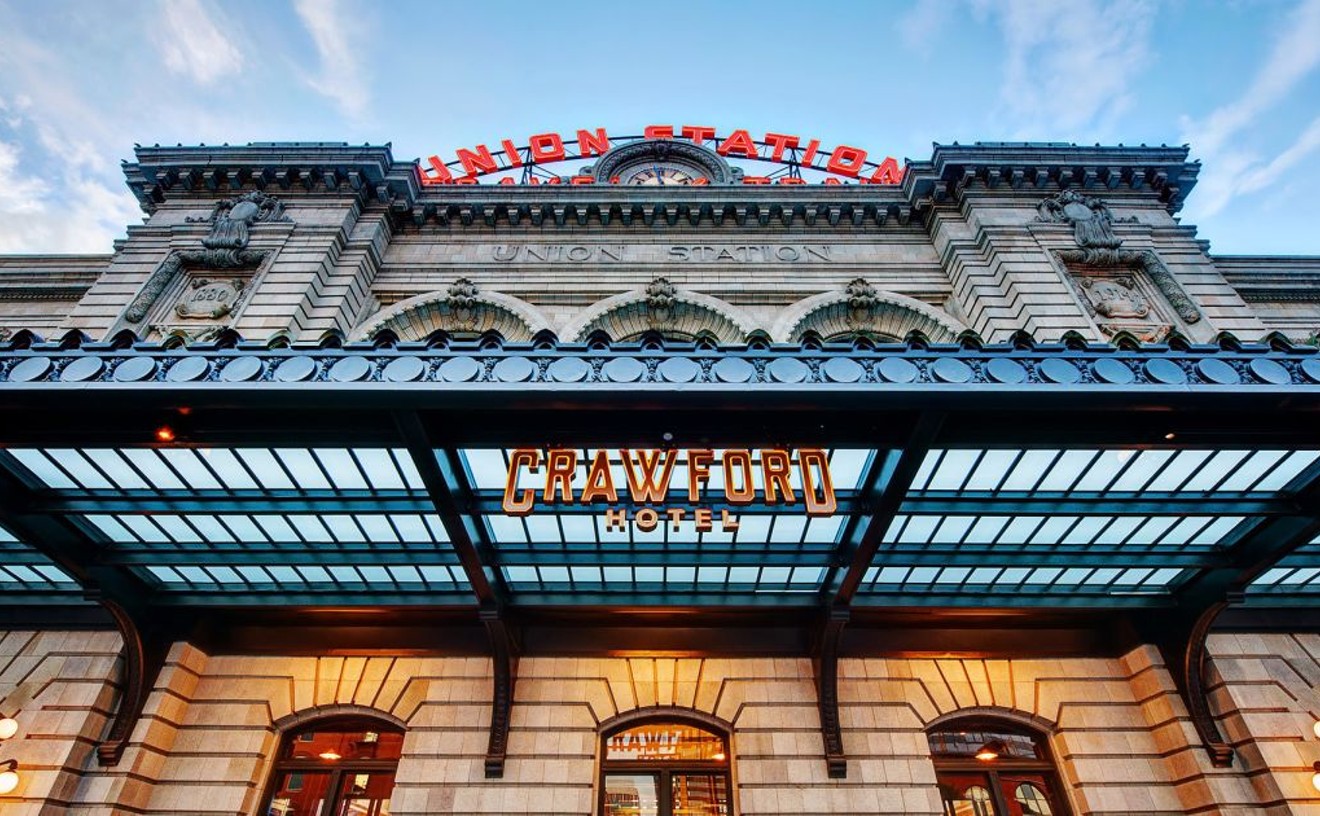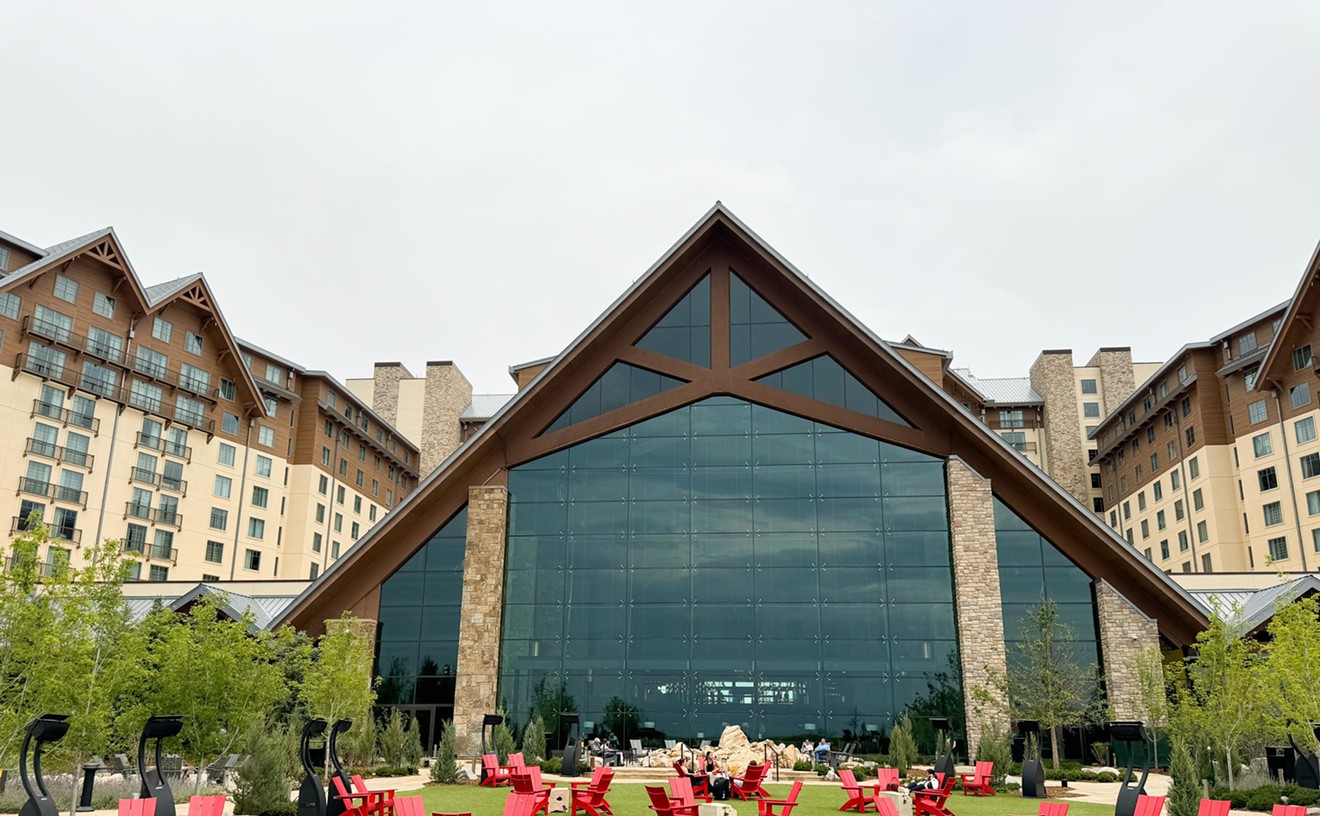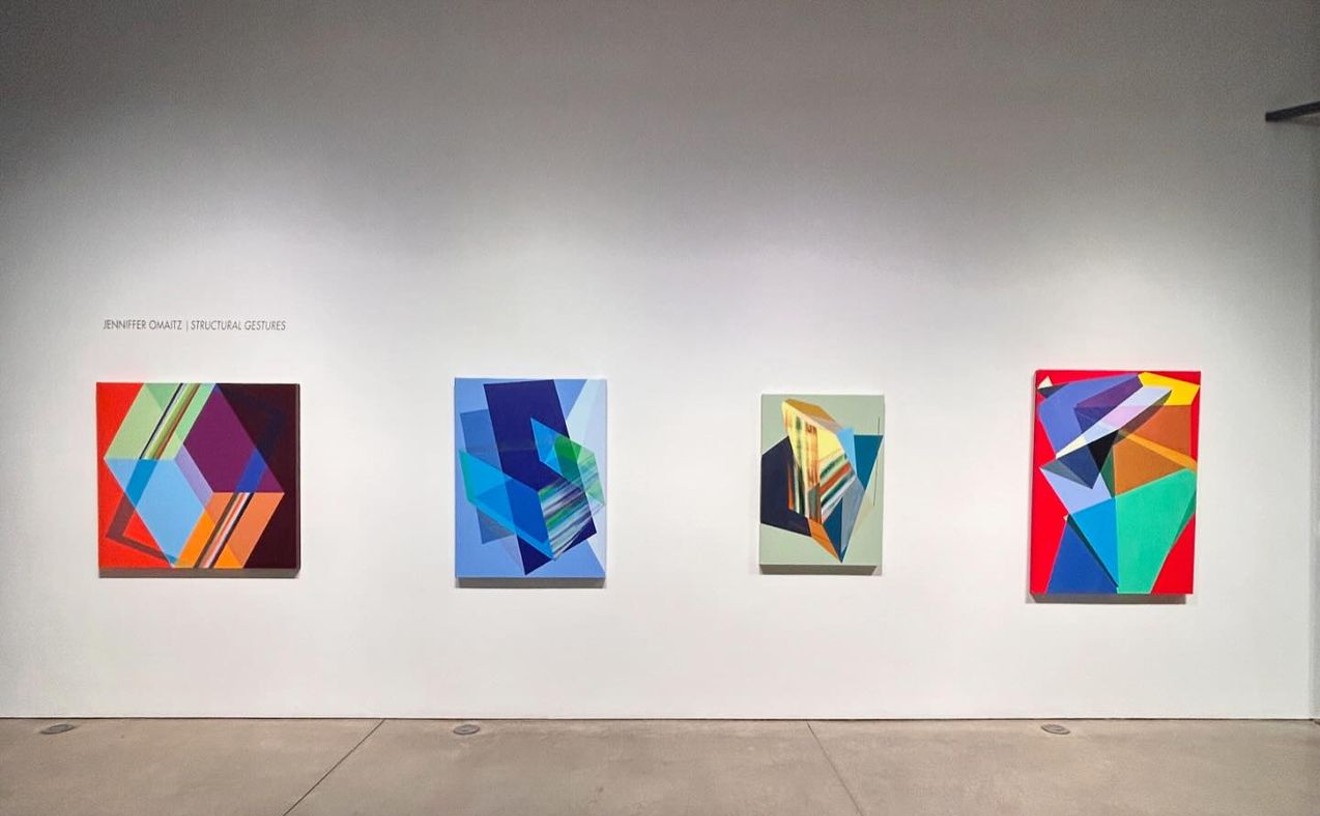Ruby’s is brimming with a vibrant array of products, each one carefully crafted and curated by the vendors themselves. From handmade jewelry to traditional spices and sauces, each item tells a unique story and offers a glimpse into the rich diversity of the city. More than just a marketplace, the shop is a space of hope and resilience, a place where newcomers can showcase their talents and find a sense of belonging in their new home. This small business has quickly become a beloved fixture in the community. We met up with founder Michelle Lasnier to learn more about Ruby's Market. Westword: Will you please describe for us what Ruby’s Market and RBazaar are?
Michelle Lasnier: Ruby’s Market is a multicultural artisan and food storefront that supports refugee and immigrant entrepreneurs and local businesses. We are a place for sharing culture and small business with everyone who comes through the door. RBazaar is our nonprofit that came out of my work in the event-planning world and my advocacy work in the refugee community. We coordinate pop-up markets and support local immigrant and refugee vendors at community events, festivals and private gatherings.
How did Ruby’s Market come to be?
It began with RBazaar, which I started in 2017 running as a pop-up model, bringing vendors together to sell at various events. We have a board of advisers made up of supporters and our vendors, who are from the immigrant and refugee community. I saw this brick-and-mortar space right at the beginning of the pandemic, and in May 2020 I brought our core group of vendors in to talk about the storefront possibility. Many came on board immediately, and because events were canceled and markets weren’t happening, for them to have a storefront was brilliant timing.
During the height of the pandemic, we did some pop-ups, and the farmers' market was trying to reopen, but they didn’t have an online platform. I already had our online system set up, so I offered to add the Pearl Street Farmers Market vendors to our e-commerce site. This became a community effort for the shoppers and the vendors that made it safe to still buy, and because the government made farmers' markets an ‘essential business,’ people could pick up their orders here. We did that for two years and only kept 10 percent to cover the cost of bags and supplies.
Can you give some examples of what you offered during the pandemic and what you’ve added?
We had the Market Box, which offered fresh food and got our chefs in front of people who were sick of cooking from scratch at home. Our chefs would prepare cooked meals, customers would order and pick up, and they would have meals for a couple of days. This turned into the Global Chef Box, which we will be bringing back as a subscription. I loved seeing the interaction between everyone at that time; we’re all at ground zero, we’re all scared, we need to mobilize together, it was everybody affected. And once I started the Market Box, every Sunday it was off and running.
During the pandemic, people were coming because of our food boxes, and it made them want to try new things. Then they saw the whole mission behind the store, and they were trying prepared food and spice blends they’d never tried before — you know, it wasn’t an apple or romaine lettuce, it was all this other food. This really kick-started me to keep going forward with carrying the prepared and packaged goods in the shop.
Next we started the Bread Bodega. I saw the need and the love of bread from our customers, and we love global breads, so we have pita bread and local sourdough, and we’re mixing local and global breads. It has been so popular that it’s now taken over an entire room on Saturdays. It smells so good here on Saturdays!
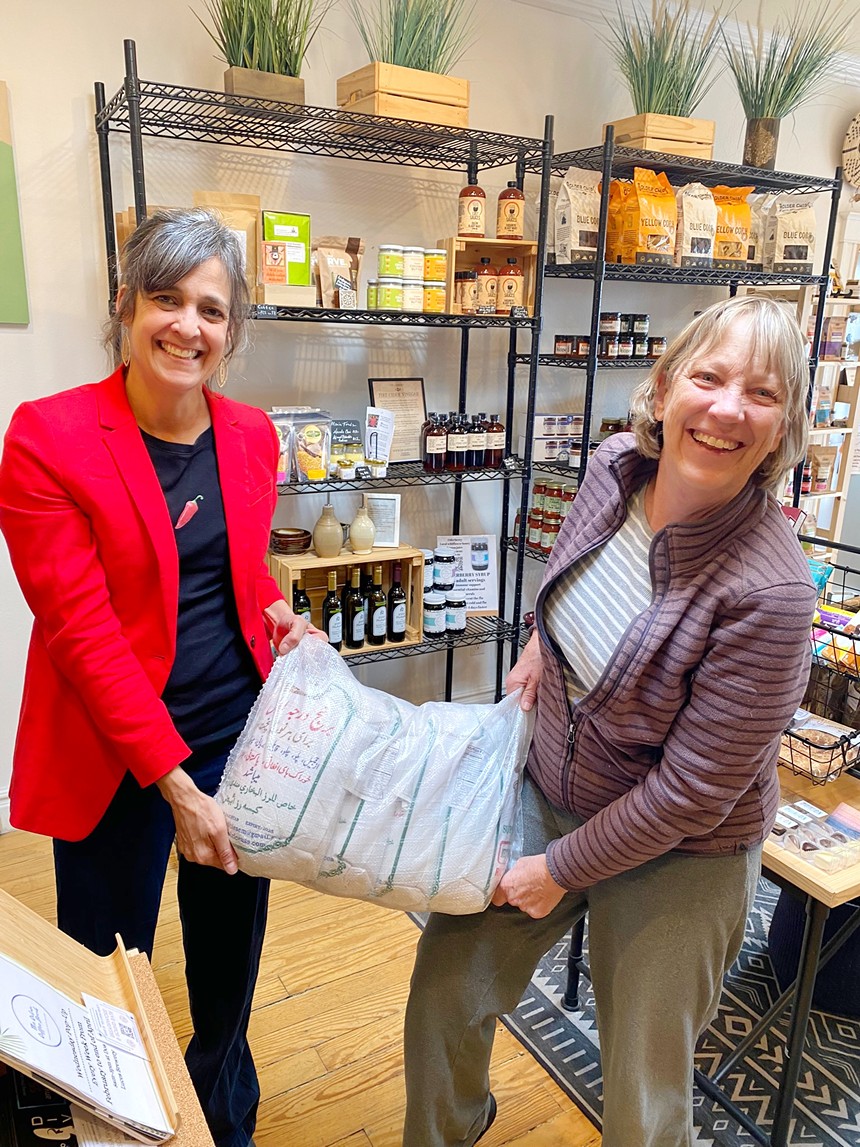
Michelle Lasnier (left) receives a donation of rice for the pantry from a regular customer.
Erika Righter
As places were shutting down, the African Community Center and Lutheran Family Services had to close their offices, and the shutdowns kept extending. We needed a central drop-off spot to serve the immigrant and refugee community. I said I’d like to start a pantry, and so we started with staples, then fresh food, and we worked jointly with those organizations. It was great to see two agencies serving the same population together with us, an outside entity and the city.
Tell us about the pantry that is still running out of here since the pandemic.
We have culturally relevant food that we give to arriving refugee families the week they get settled, and the agency sends me their name and dietary needs. We do collections for the communities, and people want to help, but no one knows what to do, so this is a great way to do it.
What are the most common questions people ask when they reach out?
Right now it’s: "Do you have the Reunion sourdough or olive and za’atar loaf?” We get the sourdough from Reunion twice a week.They’ll tell us they saw something on a vendor’s website who they met at a pop-up, and they can’t find it anywhere and are hoping we have it. They might see the Instagram post we make after someone restocks. They also come in and ask what our community needs.
What is happening on the RBazaar side of things?
RBazaar sponsors two booths in the Pearl Street Market, and the vendor spots are for refugee and immigrant entrepreneurs. We did the big events because we made more money. Some of the smaller shows are really great for experience, but they are not making enough money, so I had to advocate for really assessing which markets we do. It’s about so much more than selling; it’s activating people to volunteer, to speak their mind, to share information about markets, and growth for the vendors. It’s important that we are telling the vendors’ stories. The pandemic muted RBazaar, but it didn’t mute the vendors. They’re in here, and now it’s back full force. It’s amazing to circle back to the events, having them be a presence. Seeing the progression from doing a farmers' market with us and then their own events on their own.
What are some of the challenges of having a small business that most folks don’t know about?
Supply-chain issues! There will be customers who like these products and know we carry them, and the vendors might not be able to get the glass jars, so they can’t get their products out, but I’m finding most customers get it and will come back. The makers want to deliver, and it’s a struggle. Showing up in a snowstorm, being all in on making it work. We’re still in the growth phase, and staffing is on the wish list. It can be hard to always stay true to your mission, like in a brick-and-mortar, to have a cultural food or whatever your passion is, knowing it may not be for everybody, but customers light up with that, because it’s about humanity. I didn’t think I’d start a pantry, but we responded to our community, and now I think that will always be a part of what we do.
How do you want people to feel in your business?
I want them to feel intrigued, inspired, hit by at least three senses — and we get that pretty regularly.
What is a small business activity you enjoy?
Constantly making the space work for our products, because they’re always changing. I love being creative with the rooms and the displays, and we have constant onboarding of new vendors.
Why should people support small businesses?
Supporting small businesses is supporting your neighbors and reducing your supply-chain footprint. With Ruby’s, the product is attached to a real person, and when customers come in here and ask a question, it makes the product more alive. We tell them about how that product came to be and who that person is. You're not just wearing a piece of jewelry made in a factory. Not to get ‘woo-woo,’ but people feel the energy in that piece. I feel the energy; it’s more alive with handmade.
What is one of your favorite products in the shop right now?
Susan’s samosas and lentil soup. She is from Sudan, she is amazing, and she is growing her business. She grew up in an orphanage in Nairobi, and someone in Boulder connected her to a foster family; other vendors connected her to me. They saw that she needed some guidance, and two people mentioned her and we got connected.
What is one of your favorite small businesses to support in the neighborhood?
Five Green Boxes has always supported our vendors. Even before we were in this location, we did pop-ups there, and they have done a lot to organize culturally celebratory events that our vendors participate in.
Ruby's Market
1569 South Pearl Street
rubysmarketdenver.com

